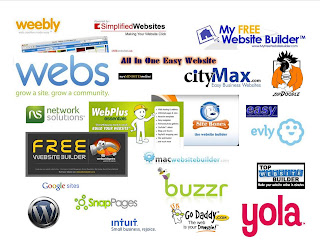Small businesses struggle with website options. With all the do-it-yourself tools available, it’s tough to know when to turn to a professional for help. Long ago, Martin Kelly put this up as a comment here. I think it’s still relevant and helpful to small business owners.
 |
| A few of the do-it-yourself website choices |
A few website basics, and why professional help can be worth it
By Martin Kelly
martinkelley.com
I think the do-it-yourself tools have been great. The more that goes up online, the more useful the Internet becomes.
The most important things to have up on a website is your contact information, of course. After that I always recommend pictures or something else that will give potential customers an idea of what you’re like.
Get your own domain. The biggest advantage is that you can easily move the site to some new system a few years down the road if you grow or something else becomes available. As useful as the DIY website tools are, I always think there’s got to be a better way to do it.
And blogs can be a great way to get lots of different, keyword-rich content up there. I recently converted a rarely updated “News” section of a site over to a blog (just cutting and pasting the existing items) and put three excerpts on the main site’s homepage. That alone increased the site’s “keyword relevancy” score (as measured by domaintools.com) by about twenty percent. I wouldn’t even worry about keywords. If you talk about what customers are interested in on the blog, then people interested in that will start finding your site.
I used to work as the customer service person in a small bookstore with about 50% internet sales and would find myself fielding the same questions every few months. I started copying my email answers into my personal blog, and it generated tons of interest. This was no extra work, it was just remembering that an email I was writing was a conversation others might be interested in.
DIY sites that are kept up to date, quirkily revealing and fun are much more interesting (even when they put white text over lime green!) than tasteful high priced sites.
But I do want to remind everyone that small design houses can also be a vital part of the local small business eco-system. The owner of a small design shop I started working at recently seems to know everyone in town, goes cheerfully to every charity event, and recently signed up to sponsor a little league team! A simple professionally-designed site costs a lot less than remodeling a bathroom, say, or any one of a hundred of other normal business expenses. A lot of self-built sites (or worse, nephew-home-from-college-built sites) have major problems that keep them from being visible to Google or make it hard for visitors to get to the information you want them to see. Sometimes a professional touch can make a difference.
New to SmallBizSurvival.com? Take the Guided Tour. Like what you see? Get our updates.











Couldn’t agree more.
I’m a web designer from a small town in Australia and I’ve talked to three separate business owners in the last year that have gotten websites through younger family members.
Each one has had major issues; one site took six months, another took 3 months and then said he didn’t know how to complete it and another used images that weren’t licensed.
You get an electrician in to rewire, you get a plumber to fix the toilet, if you’re going to the trouble to assemble all the content, photos, web hosting etc use a professional web designer.
Thank you, Robin. There’s a place for do it yourself, and a place for professionals. Too often, we err on the side of doing it ourselves. I think it’s related to our small town self-reliance.
I just checked a friends site, besides having broken links, it was missing meta tags, analytics ect… Some much for low dollar.
Some good tips from Martin there. There are pros and cons to DIY site building for small business owners. Is is possible to create an asset that delivers sales and leads to your business but you do have to be prepared to devote the time required to educate yourself, research and assemble the right tools for the job. Just knowing how to build a site doesn’t mean it will get found in the search engines, engage the visitor or convert to sales.